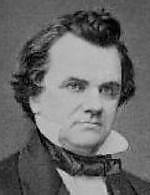|
|
"A collaborative political resource." |
US President National Vote
|
| Parents |
> United States > U.S. Executive > Popular Vote
|
| Office | President |
| Type | General Election |
| Filing Deadline | June 01, 1860 - 12:00pm |
| Polls Open | November 06, 1860 - 06:00am |
| Polls Close | November 06, 1860 - 08:00pm |
| Term Start | March 04, 1861 - 12:00pm |
| Term End | March 04, 1865 - 12:00pm |
| Contributor | Thomas Walker |
| Last Modified | Chronicler November 08, 2008 06:59pm |
| Data Sources | National Atlas of the United States |
| Description | Any hopes that President Buchanan’s administration would see an abatement in the slavery controversy ended two days after his inauguration when the U.S. Supreme Court handed down its ruling on the Dred Scott case. Scott, a slave, sued for his freedom when his master took him into a free state. The Supreme Court ruled not only that slaves were property but also that Congress did not have constitutional authority to ban slavery from the territories. The South rejoiced at the ruling as a rejection of popular sovereignty. President Buchanan accepted the Dred Scott decision and appointed a pro-slavery governor for the Kansas Territory. The new governor called a state convention to write a constitution for the territory so it could apply for statehood. The proposed constitution offered the voters of Kansas a choice between two proposals, both of which protected slavery as it existed. The northern Democrats were astonished at the proposed constitution and voted against it in Congress. The situation erupted into a small civil war.
During the mid term elections, the slavery issue continued to polarize the nation. The most prominent election was the race for the U.S. Senate in Illinois, where Douglas was challenged by Abraham Lincoln. The two candidates debated around the state in an effort to win control of the ensuing legislature which was to elect the Senator. Douglas won a narrow victory in the election, but the South learned that Douglas’ popular sovereignty would be used to halt the extension of slavery into the territories.
When the Democratic National Convention met in Charleston in 1860, it was bitterly divided. Douglas did not have enough votes to win the nomination, so his supporters urged that the platform be adopted before the balloting. If enough southern delegates bolted from the convention, Douglas would have the necessary two-thirds of the remaining delegates. The Douglas slavery plank was presented to the convention by Henry B. Payne of Ohio, and it passed with the support of all the free states and none of the slave states. Douglas’ strategy failed because the convention chose not to recognize him as the candidate until he had gained two-thirds of the original delegate votes. The delegates cast 57 ballots and could not agree on a candidate. The convention voted to adjourn and reconvene in Baltimore later.
In the intervening weeks, two other parties held conventions. The remnant of the Whigs met as the Constitutional Union Party and stated that the federal government had no power to meddle with slavery. The Constitutional Unionists nominated John Bell and Edward Everett. The new Republican Party passed over its front-runner, William H. Seward, and nominated Abraham Lincoln on the third ballot.
When the Democratic National Convention re-convened in Baltimore a month later, there were challenges to the seats of several of the southern delegates. The convention seated the Douglas men, and the remainder of the southern delegates bolted. Douglas had the necessary delegate votes, but the bolting delegates nominated VP John C. Breckinridge.
The 1860 election saw the north choose between Lincoln and Douglas while the south chose between Breckinridge and Bell. Lincoln won every northern state except NJ and received a clear majority of the electoral votes. |
|
|
 |
CANDIDATES |
|
|
| Photo | |
 |
 |
|
 |
|
| Name |
Rep. Abraham Lincoln |
Sen. Stephen A. Douglas |
V.P. John C. Breckinridge |
Sen. John Bell |
Others |
Rep. Gerrit Smith |
| Party | Republican |
Democratic |
Southern Democrat |
Constitutional Union |
Independent |
Abolition |
| Votes |  1,866,452 (39.88%) 1,866,452 (39.88%) |
1,375,157 (29.38%) |
847,953 (18.12%) |
590,631 (12.62%) |
360 (0.01%) |
171 (0.00%) |
| Margin | 0 (0.00%) |
-491,295 (-10.50%) |
-1,018,499 (-21.76%) |
-1,275,821 (-27.26%) |
-1,866,092 (-39.87%) |
-1,866,281 (-39.87%) |
| Predict Avg. | 0.00% |
0.00% |
0.00% |
0.00% |
0.00% |
0.00% |
| Finances | $0.00 |
$0.00 |
$0.00 |
$0.00 |
$0.00 |
$0.00 |
|
|
| Endorsements | |
|
|
|
|
|
|
| Date |
Category |
Headline |
Article |
Contributor |
|

|

